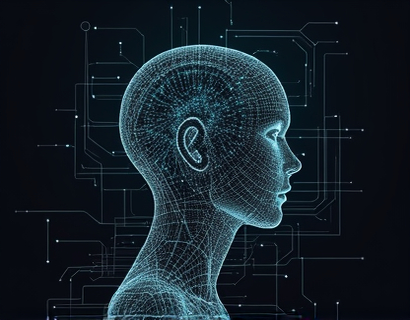Personalized AI Companions: Transforming Childhood Creativity and Emotional Well-Being Through Interactive Digital Friends
In an era where technology increasingly intersects with daily life, the concept of personalized AI companions for children is emerging as a transformative force in childhood development. These AI-driven imaginary friends are not just digital entities but sophisticated tools designed to enhance creativity, emotional well-being, and social skills. By offering a safe and imaginative space, these companions provide a unique platform for children to explore their thoughts, feelings, and imagination in a way that traditional toys and methods cannot match.
Enhancing Creativity Through Personalized Interactions
The creativity of children is a vital aspect of their development, fostering problem-solving skills, critical thinking, and innovation. Personalized AI companions revolutionize this process by adapting to each child's unique interests and creative inclinations. Unlike generic toys, these AI companions learn from interactions, tailoring their responses and activities to spark new ideas and creative expressions. For instance, a child interested in art might find the AI companion suggesting new techniques, providing virtual art supplies, and even creating collaborative art projects. This level of personalization ensures that the creative journey is both engaging and meaningful, encouraging children to explore and express themselves in diverse ways.
Fostering Emotional Health and Well-Being
Emotional well-being is another critical area where personalized AI companions excel. Children often struggle to articulate their feelings or find the right words to express themselves. AI companions serve as empathetic listeners, offering a non-judgmental space for children to share their emotions. Through gentle prompts and guided conversations, these companions help children identify and understand their feelings, promoting emotional intelligence. Moreover, by simulating various social scenarios, AI companions can help children practice coping strategies and develop resilience, essential skills for navigating the complexities of emotional life.
Creating a Safe Space for Social Skill Development
Social skills are fundamental to a child's ability to form healthy relationships and succeed in various aspects of life. Personalized AI companions provide a controlled environment where children can practice and refine their social skills without the pressures of real-world interactions. These companions can simulate conversations, role-play different social situations, and offer feedback on communication techniques. For children who are shy or have social anxiety, interacting with an AI companion can be a stepping stone to building confidence in real social settings. The AI's ability to adapt to the child's pace and comfort level ensures a supportive and encouraging experience.
Promoting Thoughtful Self-Expression
Self-expression is a crucial component of a child's development, allowing them to communicate their unique perspectives and emotions. Personalized AI companions facilitate this process by offering a variety of creative outlets. Whether through storytelling, drawing, or role-playing, these companions encourage children to explore different forms of expression. The AI's responsiveness and adaptability mean that each child's self-expression is valued and celebrated, fostering a sense of self-worth and confidence. This environment not only enhances creative skills but also helps children develop a strong sense of identity.
Interactive Storytelling: A Gateway to Imagination
One of the most engaging ways personalized AI companions enhance creativity is through interactive storytelling. Children can embark on virtual adventures, creating characters, plots, and settings that are entirely their own. The AI companion acts as a co-storyteller, suggesting plot twists, character developments, and even writing prompts. This collaborative process not only stimulates the child's imagination but also improves narrative skills and language proficiency. The ability to see their ideas come to life in a digital format can be incredibly motivating, encouraging children to continue exploring their creative potential.
Emotional Role-Playing: Building Empathy and Understanding
Emotional role-playing is another powerful feature of personalized AI companions. By simulating various emotional scenarios, these companions help children understand and manage their own emotions as well as empathize with others. For example, the AI might present a situation where a friend feels sad or angry, and guide the child through a conversation to help the friend feel better. This practice not only enhances emotional intelligence but also teaches valuable life skills such as compassion and conflict resolution. The AI's ability to provide immediate feedback and guidance makes these role-playing exercises both effective and educational.
Supporting Social Skills Through Guided Interactions
Social skills are often developed through interactions with peers, but for some children, these opportunities may be limited. Personalized AI companions bridge this gap by offering guided interactions that mimic real-life social scenarios. These interactions can range from simple greetings and introductions to more complex conversations about shared interests and feelings. The AI's adaptability ensures that each interaction is tailored to the child's level of comfort and skill, gradually challenging them to expand their social repertoire. This approach helps children feel more confident and prepared for real-world social situations.
Encouraging Independent Play and Exploration
Independent play is essential for a child's cognitive and emotional development, allowing them to explore their interests at their own pace. Personalized AI companions support this by providing a rich, self-directed play environment. Children can engage in a wide range of activities, from building virtual worlds to solving puzzles, all within a safe and controlled digital space. The AI's ability to adapt to the child's interests and skill level ensures that the play remains challenging and engaging, promoting continuous learning and growth. This independence fosters a sense of autonomy and self-reliance, crucial for a child's overall development.
Parental Involvement and Oversight
While personalized AI companions offer numerous benefits, parental involvement remains crucial. Parents can monitor their child's interactions, adjust settings to suit the child's needs, and engage in joint activities with the AI companion. This shared experience not only strengthens the parent-child bond but also allows parents to understand and support their child's creative and emotional development. The AI's reporting features can provide insights into the child's progress, helping parents identify areas where additional support may be needed. This collaborative approach ensures that the benefits of AI companions are maximized while maintaining a balanced and supervised environment.
Conclusion
Personalized AI companions represent a significant advancement in childhood development tools, offering a unique blend of creativity, emotional support, and social skill development. By providing a safe and imaginative space, these digital friends empower children to explore their potential in ways that traditional methods cannot. As technology continues to evolve, the potential for AI companions to positively impact childhood development is vast, promising a future where every child has the opportunity to thrive creatively and emotionally.











































